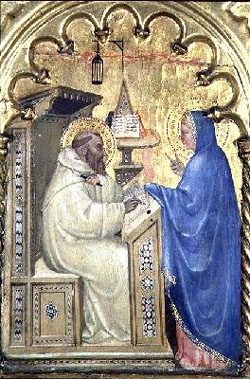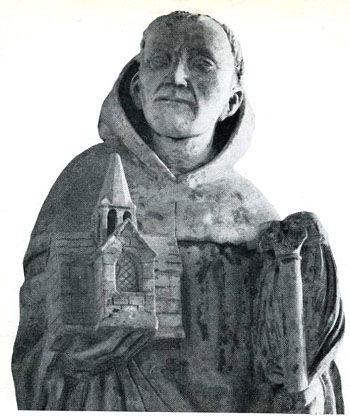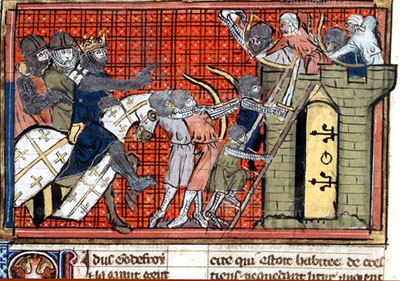 |
The Saint of the Day
St. Bernard – August 20
Prof. Plinio Corrêa de Oliveira
Biographical selection:
St. Bernard of Clairvaux, Abbot, Confessor and Doctor of the Church, 1090-1153. He is a Doctor of Marian devotion, the author of the Memorare; he was a counselor of Popes and Kings; he ended the schism caused by the Anti-Pope Anacletus II and fought against heretics. He also preached the Second Crusade.

The Virgin appearing to St. Bernard
Giovanni da Milano, 14th century
|
The following is an excerpt from the Rule of the Knights Templar inspired by St. Bernard. It is the oath the knight would take to enter the Order of the Temple:
“I swear that I will defend by my words, arms, and every possible means, even with the loss of my own life, the mysteries and articles of the Faith, the Seven Sacraments, the Symbols of the Apostles and of St. Athanasius, the Old and New Testaments with the explanations of the Holy Fathers approved by the Church, the unity of the Divine Nature and the Trinity of Persons in God, the virginity of the Virgin Mary before, during and after the parturition.
“I promise obedience to the Grand Master of the Order according to the statutes of our Blessed Father Bernard. I will engage in combat on foreign lands whenever it is necessary. I will never flee from the infidels, even should I be alone. I will observe perpetual chastity.
“I will assist with my words, arms, and actions religious persons, principally the abbots and religious of the Cistercian Order, as our brethren and special friends with whom we have a perpetual association.
“I voluntarily swear before God and His Holy Gospel that I will keep all these commitments.”
Comments of Prof. Plinio:
There are many beautiful things in here.
First, there is dedication to the Catholic Faith and the oath to die a martyr. This aim is implicit when the Templar swears to never deny any article of the Faith. If an enemy would oblige him to renounce them, the Templar knight had made the vow to die rather than do so.

St. Bernard holding a minuature of the Abbey of Clairvaux
|
Second, there is the vow of obedience. He promises obedience to the Grand Master, an immolation of his life by surrendering his will to another. With the vow of obedience, a man renounces self-government. He is no longer master of himself, and another man commands him what to do. With this, the religious hands over one of the most profound and elevated things a man can give, which is his own will.
It is beautiful to see the docility of the Templar knight. At first glance, one would say that such obedience robs a man of something of his virility. But this is not true. By the vow of obedience, at depth, a man becomes freer, because he puts his will in the hands of a superior who leads him along the way of virtue. Doing this, he becomes freer than if he would have to decide by himself whether or not to practice a virtue.
By obligating himself to practice virtue by the vow of obedience, he becomes freer, for freedom is not the liberty to practice evil, but rather the liberty to choose the means to practice virtue, to do good. To do evil is not true liberty; it is a false liberty; actually it is the slavery of man to the Devil, the world and the flesh. With the vow of obedience, the door to this false liberty is locked, and what remains is the true liberty to do good. This is appropriate for the life of the knight. He is the man par excellence who chooses the liberty par excellence – which is the liberty of only doing good. With this, he has already won, potentially, the battle against his worst enemy, sin.
Third, he also takes a special vow, which is the vow to never flee before the enemy. To understand the seriousness of this vow, you can imagine a Templar knight riding his horse alone on a road. He sees five infidels of Mohammed on horseback in the distance. If he flees, he can save his life; but if the enemies see him fleeing, pursue and kill him, then he goes to Hell, because he broke his vow. So, he does not flee, but prepares himself to face the enemies. You see how this vow arrests a man’s natural fear, and obliges him to be courageous. The fear of Hell obliges him to be courageous. Again, he becomes free from his own cowardice. He goes forward securely and serenely to face his enemies. It is extraordinarily intelligent and superbly beautiful.

Crusader knights lead a siege during the First Crusade
|
Fourth, there is the vow of chastity. He promises perpetual chastity. In the Rule of the Knights Templar, there is a eulogy of chastity that I like very much. It says “chastity is security in the fight.” I will explain this. If a cavalry charge is made against a very strong enemy, as the charge moves forward to clash with the adversary, a married man would normally be thinking about his wife and children whom he could leave a widow and orphans should he die. Further, if the fight becomes very difficult, the natural tendency of the married man is to flee in order to protect his family. It is understandable. But with these men you do not have security in the attack. From one moment to another, the married knight can flee.
On the contrary, the man who is unmarried and chaste does not have this concern. In such circumstances, he will be thinking of the glory of God and the need to defeat the enemy. Chaste knights, therefore, permit a stronger attack that can endure all kinds of counter-attacks. This explains the motto “chastity is security in the fight.”
Fifth, there is something else in this selection that most people don’t realize, which is the brotherhood that existed between the Knights Templar and the Cistercians. Both Orders have St. Bernard as their co-founder. How beautiful that those two Orders, one contemplative and another an order of warriors, were considered twin orders. Actually, contemplation provides the foundation for the true fight. They are harmonic contrasts that complement one another. How well contemplation and war fit together!
Beyond this, how beautiful is the Catholic Church where all the harmonic contrasts merge together in perfect unity! She is so beautiful that Progressivism cannot disfigure her. The wrinkles and stains that Progressivism puts on her face are transitory. The Catholic Church will wipe them away with horror when the Reign of Mary will be implanted.
After it is established, the best thing to do will be to convene a great Council. At this Council the Church will clearly demonstrate that all these horrors we are witnessing today did not come from her spirit.
Let us ask St. Bernard to intercede before the Divine Throne in order to hasten the coming of the Reign of Mary.


  | | Prof. Plinio Corrêa de Oliveira | |
The Saint of the Day features highlights from the lives of saints based on comments made by the late Prof. Plinio Corrêa de Oliveira. Following the example of St. John Bosco who used to make similar talks for the boys of his College, each evening it was Prof. Plinio’s custom to make a short commentary on the lives of the next day’s saint in a meeting for youth in order to encourage them in the practice of virtue and love for the Catholic Church. TIA thought that its readers could profit from these valuable commentaries.
The texts of both the biographical data and the comments come from personal notes taken by Atila S. Guimarães from 1964 to 1995. Given the fact that the source is a personal notebook, it is possible that at times the biographic notes transcribed here will not rigorously follow the original text read by Prof. Plinio. The commentaries have also been adapted and translated for TIA’s site.
|
Saint of the Day | Home | Books | CDs | Search | Contact Us | Donate

© 2002- Tradition in Action, Inc. All Rights Reserved
|
 |

|